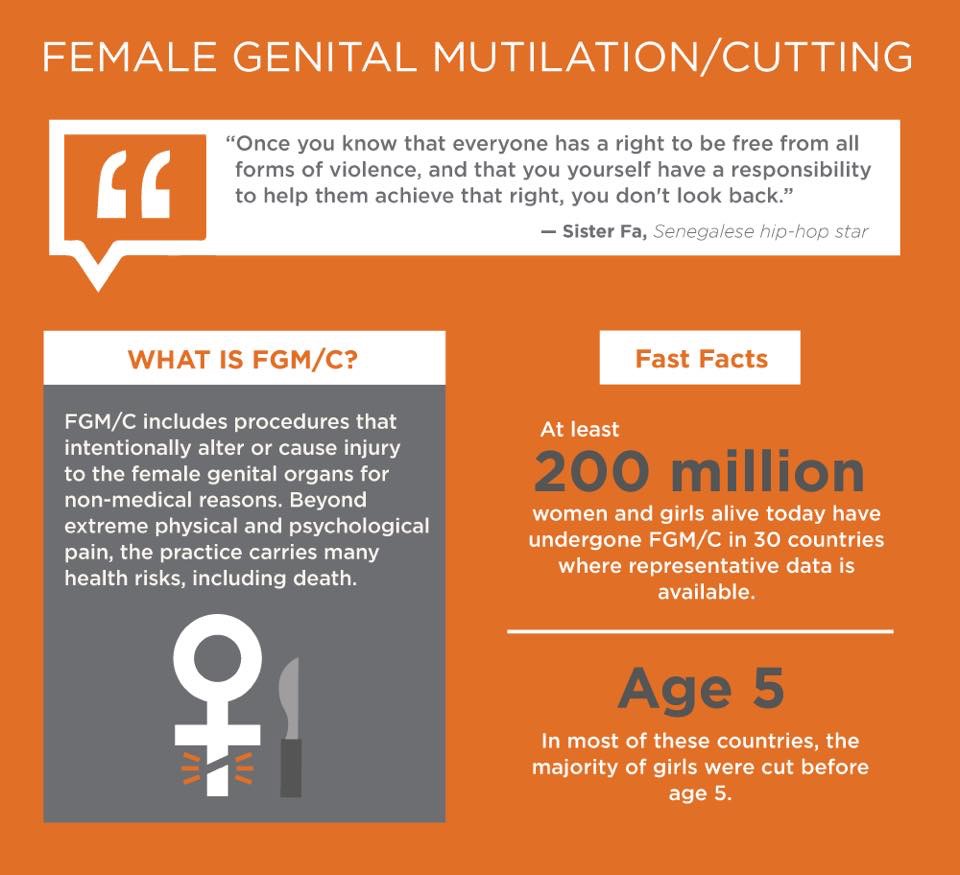The time is now! A Call to End Female Genital Mutilation
 “Sustainable development demands full human rights for all women and girls. The 2030 Agenda for Sustainable Development promises an end to this practice by 2030.”- UN Secretary General
“Sustainable development demands full human rights for all women and girls. The 2030 Agenda for Sustainable Development promises an end to this practice by 2030.”- UN Secretary General
Female Genital Mutilation reflects deep-rooted inequality between the sexes, and constitutes an extreme form of discrimination against women and girls. The practice also violates their rights to health, security and physical integrity, their right to be free from torture and cruel, inhuman or degrading treatment, and their right to life when the procedure results in death.
“There is no developmental, religious or health reason to cut or mutilate any girl or woman.” On 20 December 2012, the UN General Assembly adopted Resolution A/RES/67/146 in which it
“Calls upon States, the United Nations system, civil society and all stakeholders to continue to observe 6 February as the International Day of Zero Tolerance for Female Genital Mutilation and to use the day to enhance awareness- raising campaigns and to take concrete actions against female genital mutilations”.
Key Facts:
• Globally, it is estimated that at least 200 million girls and women alive today have undergone some form of FGM.
• Girls 14 and younger represent 44 million of those who have been cut, with the highest prevalence of FGM among this age in Gambia at 56 per cent, Mauritania 54 per cent and Indonesia where around half of girls aged 11 and younger have undergone the practice.
• Countries with the highest prevalence among girls and women aged 15 to 49 are Somalia 98 per cent, Guinea 97 per cent and Djibouti 93 per cent.
• FGM is mostly carried out on young girls sometime between infancy and age 15.
• FGM cause severe bleeding and health issues including cysts, infections, infertility as well as complications in childbirth increased risk of newborn deaths.
• FGM is a violation of the human rights of girls and women.
• The Sustainable Development Goals in 2015 calls for an end to FGM by 2030 under Goal 5 on Gender Equality, Target 5.3 Eliminate all harmful practices, such as child, early and forced marriage and female genital mutilation.
• The elimination of FGM has been called for by numerous inter-governmental organizations, including the African Union, the European Union and the Organization of Islamic Cooperation, as well as in three resolutions of the United Nations General Assembly.
Putting an end to end to female genital mutilation would require a comprehensive dialogue on sexual and reproductive health from a rights based perspective and realization of bodily autonomy. We believe in the right of women and girls to decide what to do with their bodies. Saying no FGM and saying yes to safe abortion!
References:
http://www.un.org/en/events/femalegenitalmutilationday/






